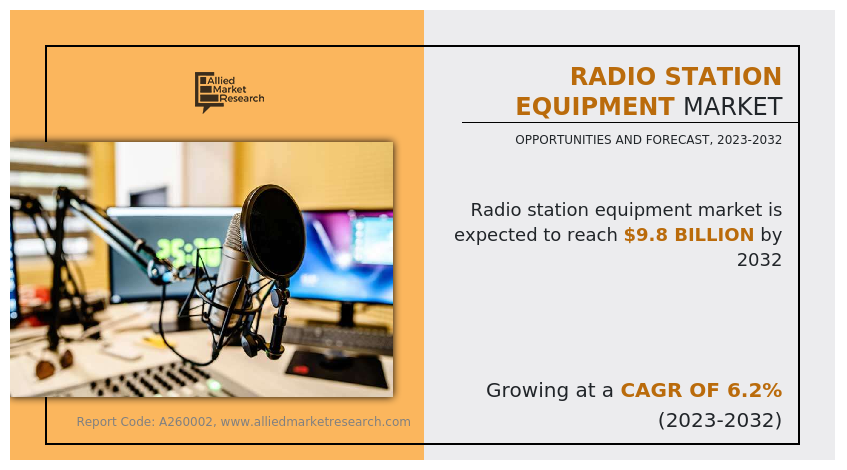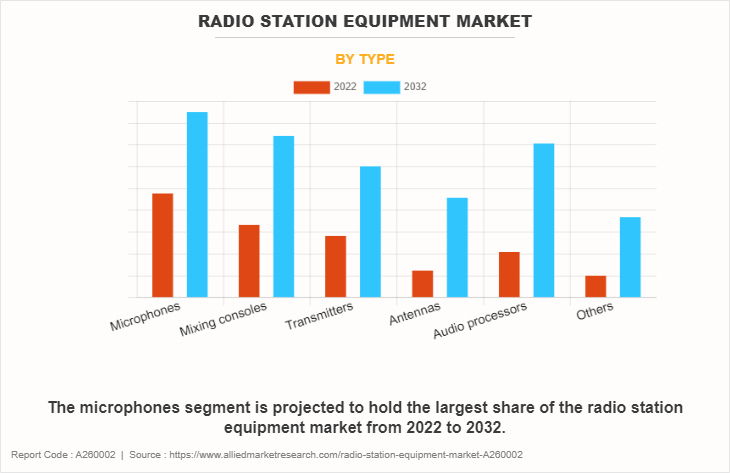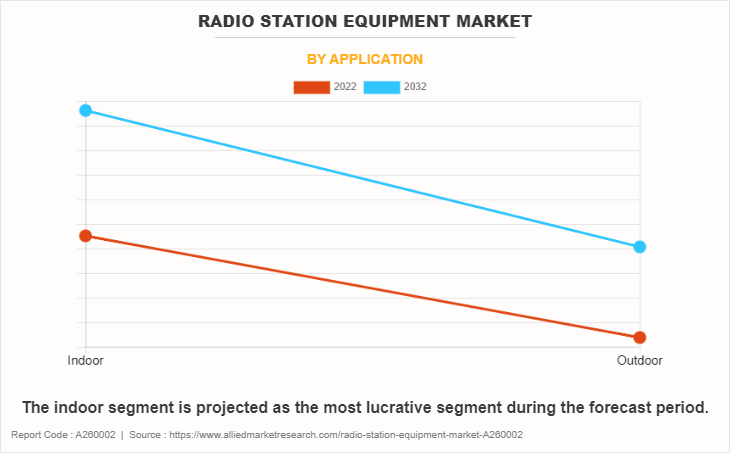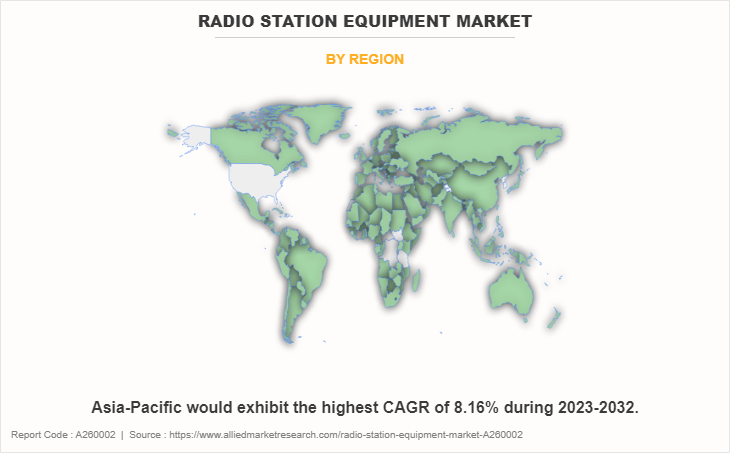Radio Station Equipment Market Research, 2032
The Global Radio Station Equipment Market was valued at $5.4 billion in 2022, and is projected to reach $9.8 billion by 2032, growing at a CAGR of 6.2% from 2023 to 2032.
Radio station equipment consists of various electronic devices, hardware, and technological components necessary for the functioning and broadcasting activities of a radio station. This equipment is crucial in recording, refining, and sending out audio material, enabling radio stations to air music, news, talk shows, commercials, and other entertainment or informational content to their audience. This includes transmitters, antennas, microphones, mixing desks, audio processing units, headphones, and several automated systems. All these components are integral in transmitting content to listeners via radio waves or digital broadcast techniques. These tools help ensure the smooth and efficient functioning of radio stations, enabling them to provide high-quality and uninterrupted broadcasts to their listeners.
The radio station equipment market is continuously evolving within this dynamic industry. Developments in digital technology, automation, and internet streaming are major forces driving change and influencing the direction of radio station operations. Moreover, governmental regulations and standards, such as those implemented by the Federal Communications Commission (FCC) in the United States, play a crucial role in determining the equipment and technologies adopted by broadcasters.

Segment Overview
The radio station equipment market is segmented into Type and Application.

By type, the market is fragmented into microphones, mixing consoles, transmitters, antennas, audio processors, and others.

By application, the market is bifurcated into indoor and outdoor.

By region, the radio station equipment industry is analyzed across North America (the U.S., Canada, and Mexico), Europe (the UK, Germany, France, and rest of Europe), Asia-Pacific (China, Japan, India, South Korea, and rest of Asia-Pacific) and LAMEA (Latin America, Middle East, and Africa).
Country-wise, the U.S is home to a dynamic and technologically superior broadcasting industry, populated by a wide variety of radio stations and networks designed to appeal to numerous audience segments. Emphasizing innovation and technological progress, the U.S. has fostered an escalating demand for sophisticated radio station equipment, guaranteeing top-notch audio quality and efficient content transmission. The rising trend of digital broadcasting technologies, the growing interest in podcast production, and the burgeoning field of internet radio services have further heightened the demand for sophisticated equipment. The U.S.'s significant standing in the radio station equipment market share can be credited to its pivotal role as a hub for innovation, content creation, and technological progress within the constantly evolving sector of radio broadcasting throughout North America.
In Europe, the UK has established itself as a leading force in the radio station equipment market, particularly in terms of revenue share in 2022. This leadership is due to several key factors, including a robust domestic market, a dynamic environment for innovation, and supportive government policies. The UK's extensive history in radio broadcasting has resulted in one of the largest domestic markets in Europe, fueling significant demand for radio station equipment and fostering a prosperous local industry. Additionally, the UK boasts a strong heritage of innovation in broadcasting, with its universities and research institutions being pioneers in new technology development, keeping the UK at the forefront of global competition in radio station equipment. Furthermore, the UK government's favorable policies towards the broadcasting sector have created an encouraging climate for investment and industry growth.
In the Asia-Pacific area, China is set to become a significant market for the radio station equipment sector, driven by various factors. First, the extensive and quickly expanding broadcast landscape in China, with its many radio stations and networks, indicates an increasing demand for high-end equipment to address the evolving requirements of both content producers and listeners. Second, China's substantial investment in technological innovation and digital broadcasting advancements is propelling a shift towards superior audio content, thereby fostering a demand for more advanced equipmen. Additionally, China's dynamic economy, combined with its rapidly growing entertainment and media industries, has further accelerated the radio station equipment market demand, making it a vital market for industry growth and innovation in the Asia-Pacific region.
In the LAMEA region, Latin America is emerging as a key market in the radio station equipment market overview. This growth is fueled by a combination of factors, including a strong regional demand for radio broadcasting equipment, a growing focus on digital radio, and a supportive regulatory environment. Radio broadcasting has traditionally been a popular medium in Latin America, with a large and engaged audience. This has led to a sustained demand for radio station equipment, fueling the growth of a regional industry. Additionally, many Latin American countries are embracing digital radio technology, which requires specialized equipment. This shift towards digital broadcasting is further stimulating the growth of the market in the region. Moreover, supportive regulatory policies and government initiatives aimed at promoting the development of the broadcasting sector have created a favorable environment for investment and innovation in radio station equipment. These factors have all contributed to Latin America's strong position in the global radio station equipment market.
One significant driving factor in the radio station equipment market is the global transition to digital broadcasting. There is a rising demand for cutting-edge equipment and services that support digital formats such as digital audio broadcasting (DAB) and digital radio mondiale (DRM) solutions as countries shift from analog to digital radio broadcasting. This presents a notable opportunity for manufacturers to provide advanced equipment that aligns with this transition, enabling radio stations to deliver higher-quality and more efficient broadcasts.
Despite these developments, a significant constraint for the radio station equipment market growth is the substantial cost associated with the shift from analog to digital broadcasting. This shift involves significant investments in new digital equipment, infrastructure upgrades, and licensing fees. These financial burdens can be particularly challenging for smaller radio stations with limited budgets, discouraging them from making essential equipment upgrades.
However, the growing demand for automation and playout systems in the radio station equipment market presents a significant opportunity. Radio stations are increasingly focused on operational efficiency and cost reduction, driving the need for advanced automation solutions, which often include advanced radio station phone systems, presents a significant opportunity. Companies that excel in providing cutting-edge automation systems, which include intelligent scheduling, effective content management, and voice recognition capabilities, are poised to gain a competitive advantage. These solutions optimize broadcasting processes, reduce manual labor, and enhance overall efficiency, making them highly attractive to radio stations looking to optimize their operations while remaining cost-effective. This trend offers a promising growth avenue within the radio station equipment market for forward-thinking companies.
Top Impacting Factors
The radio station equipment market is expected to witness notable growth owing to technological advancements and increase in demand for online streaming. Moreover, mobile and in-car integration is expected to provide lucrative opportunity for the growth of the market during the forecast period. On the contrary, competition from digital media limits the growth of the market.
Competitive Analysis
The report highlights the highly competitive nature of the Radio station equipment industry, owing to the strong presence of existing vendors. Vendors with extensive technical and financial resources are expected to gain a competitive advantage over their counterparts by effectively addressing market demands. The competitive environment in this market is expected to increase as product launches, innovations, and new product developments strategies adopted by key vendors increase. Competitive analysis and profiles of the major Radio station equipment market players that have been provided in the report include Allen & Heath Limited, Behringer (Music Tribe Commercial MY Sdn. Bhd.), Guangdong Takstar Electronic Co., Ltd., HARMAN International, Icom America, Mackie (LOUD Audio, LLC), Roland Corporation, Sennheiser electronic GmbH & Co. KG, Shure Incorporated, and Yamaha Corporation.
Key Developments/ Strategies
According to the latest radio station equipment market forecast, Sennheiser Electronic GmbH & Co. KG, HARMAN International, Shure Incorporated, Mackie (LOUD Audio, LLC), and Behringer (Music Tribe Commercial MY Sdn. Bhd.) are the top players in the market. Top market players have adopted various strategies, such as product launches, innovations, and new product developments to expand their foothold in the radio station equipment market.
April 2023 - Sennheiser and Neumann, two leading manufacturers of professional audio equipment, were honored for Outstanding Technical Achievement at the 38th Annual NAMM TEC Awards. Sennheiser's XS Wireless IEM system won in the Wireless Technology category for its innovative design and performance, while Neumann's NDH 30 headphones were awarded in the Headphone/Earpiece Technology category for their exceptional audio quality and comfort.
October 2023 - HARMAN International launched the JBL CLUB and Infinity Reference subwoofers. These subwoofers, offering deep bass and energy efficiency, feature 400W and 350W power handling with Selectable Smart Impedance (SSI). They are compatible with various box configurations and are designed for distortion-free performance. The JBL CLUB series boasts a Poly woofer cone and a signature JBL design, while the Infinity Reference series features double-stacked magnets and a unique design.
September 2023 - Shure unveiled the second generation of its AONIC 50 Wireless Noise Cancelling Headphones. The new headphones feature spatial audio, improved active noise cancellation, up to 45 hours of battery life, and other enhancements.
May 2023- Mackie introduced the DLZ Creator adaptive digital mixer, designed for podcasting and streaming. It features customizable on-screen controls and offers the option to record or stream podcasts directly to a computer via USB-C. Alternatively, it allows for multitrack audio recording to an SD card without the need for a computer. The mixer boasts a 10.1-inch touch display, audio processing tools, and effects like reverb and delay. It also supports flexible multitrack recording and stereo playback to MicroSD and USB thumb drives.
Key Benefits for Stakeholders
This study comprises analytical depiction of the Radio station equipment market size along with the current trends and future estimations to depict the imminent investment pockets.
The overall Radio station equipment market analysis is determined to understand the profitable trends to gain a stronger foothold.
The report presents information related to key drivers, restraints, and opportunities with a detailed impact analysis.
The Radio station equipment market forecast is quantitatively analyzed from 2022 to 2032 to benchmark the financial competency.
The Porter's five forces analysis illustrates the potency of the buyers and suppliers in the Radio station equipment market.
The report includes the share of key vendors and Radio station equipment market trends.
Radio Station Equipment Market Report Highlights
| Aspects | Details |
| Market Size By 2032 | USD 9.8 billion |
| Growth Rate | CAGR of 6.2% |
| Forecast period | 2022 - 2032 |
| Report Pages | 249 |
| By Type |
|
| By Application |
|
| By Region |
|
| Key Market Players | Shure Incorporated, Allen & Heath Limited, HARMAN International, Behringer (Music Tribe Commercial MY Sdn. Bhd.), Guangdong Takstar Electronic Co., Ltd., Sennheiser Electronic GmbH & Co. KG, Icom America Inc., Yamaha Corporation, Mackie (LOUD Audio, LLC), Roland Corporation |
Analyst Review
The radio station equipment market is projected to experience significant growth during the forecast period. This growth is primarily driven by the increase in adoption of technology and automation in various industries, which fuels demand for advanced radio station equipment. This equipment is key to enhancing operational efficiency and productivity in the broadcasting sector. Moreover, the developments in e-commerce and the associated need for fast, reliable shipping services have also positively impacted market growth.
The market is further boosted by the emergence of cutting-edge technologies such as artificial intelligence, cloud-based broadcasting solutions, and virtual studio setups. These innovations necessitate the upgrade of traditional radio equipment, leading to a surge in investment in the sector. The integration of these advanced technologies allows radio broadcasters to improve audience targeting, automate programs more efficiently, and produce enriched content, thereby maintaining their competitive edge in the industry. All these factors collectively indicate a robust growth trajectory for the radio station equipment market in the near future.
Some of the key players profiled in the study include Allen & Heath Limited, Behringer (Music Tribe Commercial MY Sdn. Bhd.), Guangdong Takstar Electronic Co., Ltd., HARMAN International, Icom America, Mackie (LOUD Audio, LLC), Roland Corporation, Sennheiser electronic GmbH & Co. KG, Shure Incorporated, and Yamaha Corporation. These players have adopted various strategies to increase their market penetration and strengthen their position in the radio station equipment industry.
The estimated industry size of Radio Station Equipment in 2022 is $5,432.14 million.
The Compound Annual Growth Rate (CAGR) of the Radio Station Equipment Market is expected to be 6.23% from 2023 to 2032.
North America is the largest regional market for Radio Station Equipment.
The top companies to hold the market share in Radio Station Equipment are Sennheiser Electronic GmbH & Co. KG, HARMAN International, Shure Incorporated, Mackie (LOUD Audio, LLC), and Behringer (Music Tribe Commercial MY Sdn. Bhd.).
The upcoming trends in the radio station equipment market include the rise of internet radio, the increasing demand for high-quality audio, the personalization of radio content, the integration of radio and other media, and the rise of AI-powered radio automation.
Loading Table Of Content...
Loading Research Methodology...


